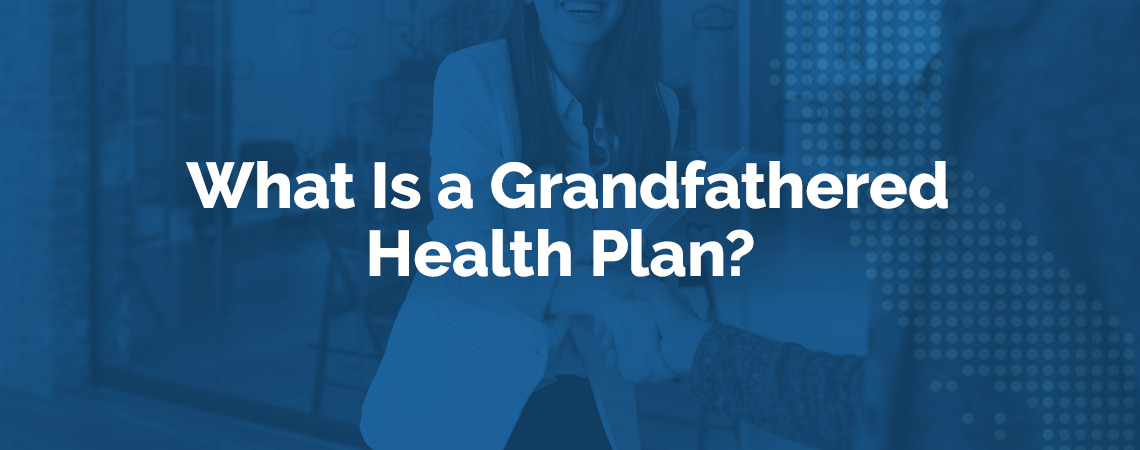What Is a Grandfathered Health Plan?
Posted: August 30, 2023

If you’re starting a new job, your employer might offer you a grandfathered health plan. This health insurance type comes with many differences and considerations from other kinds, so knowing more about it can help you decide if it is for you.
Two Types of Grandfathered Health Plans
A grandfathered health plan is a health insurance policy purchased on or before March 23, 2010, when the Obama administration instated the Affordable Care Act. This health care legislation aims to increase protections and accessibility to insurance. However, ACA also allowed some health plans to continue covering people, even if they do not meet all the act’s requirements.
There are two types of grandfathered health plans.
- Employer-provided: Employers can still offer grandfathered health plans to new employees long after the passage of ACA. To maintain their health insurance’s grandfathered status, employers must disclose the grandfathered status to employees, so they can make an informed decision about opting into benefits. They must have also maintained at least one enrolled person since March 23, 2010, though it does not have to be the same person.
- Personal: You can also keep the health plan you purchased from a broker or agent before ACA took effect. Unlike employer plans, these options are not transferable and must stay with the original holders. However, you can maintain dependents under personal grandfathered health plans.
The insurance providers of grandfathered health plans must also follow specific guidelines under ACA to maintain their grandfathered status. Providers cannot significantly cut available benefits. Policyholders must have the necessary protection and coverage to receive diagnoses and treatment for conditions. Further, they cannot substantially increase costs like coinsurance charges, cost-sharing fees and copayments. Insurance providers cannot tighten or add annual limits. These changes can cause policies to lose their grandfathered status, requiring companies to abide by all ACA protections.
Grandfathered vs. Non-Grandfathered Health Plans
The first step to understanding the differences between ACA-protected plans and grandfathered plans is knowing what ACA protections grandfathered health plans do not include. While grandfathered plans had to adopt some essential protections, the law does not require them to include others, which can prevent people from getting the care and coverage they need or want.
Your grandfathered health plan may omit some rights and protections, including the following.
- Protection for existing conditions: Under ACA, insurance companies cannot adjust rates or deny coverage for people with existing conditions. However, grandfathered plans do not have to include this right. When enrolling in a grandfathered plan, you might experience higher rates than others, depending on your medical history.
- Equality for women’s rates: ACA also prevents gender discrimination in health insurance policies. Companies cannot require higher rates and costs for women, but grandfathered policies waive this right.
- Free preventive treatments and screenings: ACA improves health and wellness by covering preventive health services like mammograms and colonoscopies. These screenings can detect life-threatening conditions before they become severe. Often, grandfathered plans do not offer free preventive services, which can increase health care costs.
- The right to appeal coverage decisions: In ACA-protected health policies, you can appeal when your provider chooses not to cover services and forces you to pay out of pocket. Unfortunately, people with grandfathered plans do not have this option. You must abide by your provider’s coverage limitations.
- Protection against dropped coverage and limits upon illnesses: If you get sick, grandfathered plans might adjust their coverage and limits, preventing you from getting the necessary coverage. ACA-protected programs have policies in place to stop this from happening.
While grandfathered plans do not have to include these protections and rights, some may offer them to policyholders anyway. To know what your grandfathered insurance provider does and doesn’t cover, carefully read all the benefits and services before enrolling in these programs.
Additionally, the ACA requires grandfathered programs to include several adjustments to increase protection. For example, dependents can remain on grandfathered policies until they turn 26 — the same age as non-grandfathered plans. Grandfathered policies also prevent excessive waiting times and ban lifetime or annual limits.
The Pros of Grandfathered Health Plans
Understanding grandfathered health plans’ pros and cons can help you determine if this option is right for you. The advantages of this health insurance type can support you and provide the necessary coverage.

1. Maintains Plan Consistency and Visibility
If you are already on a grandfathered health plan, staying with it can maintain consistency in your insurance coverage. For people who know what they need and have that level of security, keeping your grandfathered health plan can reduce the hassle and research that comes with Marketplace registration.
Because employers must disclose grandfathered health plan status, this option can increase transparency for policyholders, making them more aware of their coverage and provided services. Since grandfathered policies do not have to include some rights and coverage, carefully read your policy for full awareness.
2. Offers Some ACA Benefits and Protections
While a grandfathered health plan can seem intimidating if you’re enrolling in one for the first time, you might receive more benefits and protections than you expect. While grandfathered plans may lack some of the rights guaranteed under ACA, they may provide additional ones. Also, many plans already complied with ACA requirements before the bill passed.
Further, policyholders can also ensure some rights with the ACA-required changes for grandfathered policies. This combination of required and optional rights and benefits can provide comprehensive coverage.
3. Protects Against Drastic Changes
Grandfathered health plans cannot make drastic changes, especially regarding policyholder costs and contributions. When enrolling in a grandfathered health plan, you can avoid significant or unexpected changes because of the requirements set by insurance companies to keep grandfathered status.
The Cons of Grandfathered Health Plans
While grandfathered health plans can support many people’s needs, they come with some potential downsides you should consider before enrolling or reviewing your current plan.
1. Increases Opportunities for Discrimination
Because grandfathered health plans do not have to offer the same low rates to women and people with existing conditions, they can offer less protection or more costs for these groups. If you are a woman or have an existing health issue, you might opt out of a grandfathered plan in favor of one with more coverage and lower costs.
2. Doesn’t Include Some Vital Protections From ACA
While some grandfathered plans might offer more of the same benefits protected under ACA, they don’t have to. If your employer’s plan doesn’t include these rights, it could prevent you from benefiting from ACA and maximizing your health insurance policy.
3. Could Lose Status
If policies make significant changes, they will lose their status as grandfathered health plans. Then, they will have to offer the required protections under ACA, but they also will no longer have to oblige with the restrictions put on them. They are then free to increase rates or limits on policies.
Are Grandfathered Health Plans Better?
Grandfathered plans can benefit many people, especially those with employer-provided insurance. However, choosing an insurance policy and reviewing benefits can be confusing. Industry terms and unfamiliar requirements may be challenging to navigate.
At Health for California, our consultants can walk you and your family through your options, helping match you to policies that meet your needs. Whether you need coverage or are searching for a new policy, we can explain grandfathered policies and other available options, including family and individual health insurance plans.
Contact us today to learn more.
